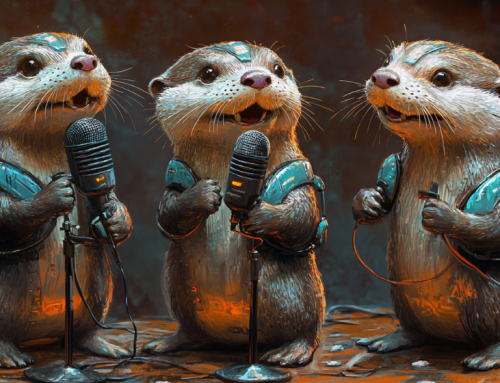
Author Enlists Algorithms to Help Pen ‘the Perfect Piece of Science Fiction’
Can AI make us better writers? It seems almost a plot device borne of yesteryear’s sci-fi stories, but what happens when an algorithm helps write science fiction? That’s the premise behind a fascinating feature of the same title published at Wired magazine presenting “Twinkle Twinkle,” a sci-fi short story written by a human author with assistance from an AI algorithm tailor-made to distill the secrets of literature’s most enduring works of science fiction.
In the nascent Age of AI, when workers from truck drivers to radiologist to paralegals will find their jobs made easier by AI and perhaps also at risk for automation, what tools might AI technologies offer writers? Writer Stephen Marche, author of The Hunger of the Wolf, teamed up with researchers Adam Hammond and Julian Brooke to see if they could create an algorithmic tool to assist Marche in his trade, a “computational system that will optimize my prose” in the author’s words.
I’ve watched technology infiltrate countless trades and crafts, oftentimes improving how people do their jobs, all while passing storytellers by. Where’s the technology that can make me better at my job?
It’s certainly a fascinating prospect; can AI help make writing easier by automating or at least streamlining the creative process? Marche’s tech partners Hammond and Brooke “have spent the past few years developing software that analyzes literary databases,” software which “can identify dozens of structural and stylistic details in huge chunks of text, and if you give them a collection of great stories—stories that maybe you wished you had written—they are able to identify all the details that those great stories have in common.”
In other words, the algorithm doesn’t create a great story or assist in the hard work of actually writing a story, but rather was designed to help Marche emulate his literary idols by sifting through work he admires in order to try and encapsulate the style, mechanics, plot and other literary features of established authors’ masterworks so that Marche could then use these lessons as a template for his “perfect” piece. In order to train the algorithm– called SciFiQ–Marche gave his co-creators “a collection of my 50 favorite sci-fi stories—a mix of golden-age classics and some more recent stuff,” including works by Ursula K. Le Guin, Philip K. Dick, Ray Bradbury, and other sci-fi greats. Hammond and Brooke then offered Marche their results:
Then they sent me a set of 14 rules, derived from a process called topic modeling, that would govern my story’s main topics and themes. All I had to do was start writing.
SciFiQ divined 14 rules for Marche to help him craft a story in as loose accordance as possible with the qualities of the 50 input stories. These 14 rules address literary style “on the textual equivalent of the atomic level” according to Marche, down to the “nouns per 100 words’ level.” Among the 14 rules admonitions are specifics ranging from the grammatical, such as an ideal target score for the “literariness” or “colloquialness” of Marche’s prose or “what percentage of text should be dialog and how much of that dialog should come from female characters,” to more thematic advice including such cryptic counsel as “The story should be set in a city. The protagonists should be seeing the city for the first time and should be impressed and dazzled by its scale.” Or “Include a scene set on a traditional Earth farm, with apple trees and cornfields.”
While writing the story that would eventually become “Twinkle, Twinkle,” Marche found it a challenge to stay within the odd whims and specific confines of SciFiQ’s dictates, comparing the process to working with a particularly stringent editor:
One way of looking at this algorithm is as an editor. It’s commissioning a story with guidelines and then forcing me to write it the way it wants. If I don’t do it right, the algorithm makes me do it again, and again, until I get it right. […] If you cut an adjective in one place, you have to put in an adjective somewhere else, and putting in that adjective somewhere else alters the balance of sentence length, paragraph length, paragraph length variation, and so on. It’s a bit like doing a Rubik’s cube. You fix one thing, you’ve messed up the side you weren’t looking at.
So, how did Marche do? Did his research associates’ algorithm indeed create “the perfect piece of science fiction”? Well…not really, to put it kindly. “Twinkle Twinkle” is an entertaining and thought-provoking read, but seems to suffer because the algorithm’s boundaries were so tightly controlled by the algorithm’s rules for a “perfect” piece that despite Marche’s efforts the piece ends up quite imperfect. The plot involves the underwhelming realities of a future where humans have discovered intelligent life, but are so far away from the alien world that the aliens’ splendorous civilization has died long before humans are able to see them.
Marche’s editor at Wired offered faint praise that “the fact that it’s really not that bad is kind of remarkable,” but the piece was universally panned by mainstream critics asked to review the piece (absent any knowledge of its arithmetically-inspired provenance). Andy Ward, editor-in-chief at Random House, offered critique that “Twinkle, Twinkle” was, “full of unnecessary detail, wooden, implausible dialog, and sentences that don’t actually hold up when you read them carefully” and that the piece “doesn’t sound human—or, better, doesn’t sound writerly,” deriding the prose as mere “words on a page.” Deborah Treisman, fiction editor for The New Yorker offered slightly gentler criticism, suggesting that the short story “seems to come from a writer who has an interesting, if still undeveloped, idea” but “hasn’t quite put enough thought into the narrative trajectory of the story or the details of the language, which, line by line, can feel a little pedestrian.”
Needless to say, Marche’s results should be best taken with a hefty serving of salt, and given its dearth of literary heft, “Twinkle, Twinkle” certainly isn’t the vanguard of some new generation of irresistibly engrossing, allegorically-enhanced super-story. Authors and publishers should rest easily with the assurance that their livelihoods aren’t in jeopardy from the guiding hand of an AI editor any time soon–let alone full-blown automation–though it’s not unforeseeable to imagine a near future where commonplace lower-quality writing may be increasingly influenced by AI; “Twinkle, Twinkle” isn’t terrible, and it takes no stretch of the imagination to envision batches of similar quality work being produced and self-published en masse by humans in increasing cooperation with algorithms. And if that sounds like science fiction, well the truth might just be stranger.







Leave A Comment